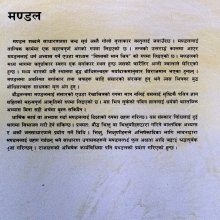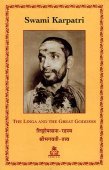Tantrika, Tāntrika, Tamtrika: 18 definitions
Introduction:
Tantrika means something in Hinduism, Sanskrit, Marathi, Hindi, biology. If you want to know the exact meaning, history, etymology or English translation of this term then check out the descriptions on this page. Add your comment or reference to a book if you want to contribute to this summary article.
Images (photo gallery)
In Hinduism
Purana and Itihasa (epic history)
Source: Cologne Digital Sanskrit Dictionaries: The Purana IndexTāntrika (तान्त्रिक).—A mode of worship but different from the Vaidika or Vedic path;1 the Tāntrika concept of Hari.2

The Purana (पुराण, purāṇas) refers to Sanskrit literature preserving ancient India’s vast cultural history, including historical legends, religious ceremonies, various arts and sciences. The eighteen mahapuranas total over 400,000 shlokas (metrical couplets) and date to at least several centuries BCE.
Arthashastra (politics and welfare)
Source: archive.org: Studies in Kautilya VocabularyTāntrika (तान्त्रिक) refers to a type of profession mentioned in the Śukranītisāra 2.128-188.—The Śukranītisāra is a Sanskrit work on ethics by Śukrācārya comprised of four chapters. The second chapter (uvarājādikṛtya, “the duties of the royal princes and the like”) describes a large number of varied topics, eg., it contains observations on the ministers, priests, sacive, treasury, a large number of officers and employees (such as a Tāntrika).

Arthashastra (अर्थशास्त्र, arthaśāstra) literature concerns itself with the teachings (shastra) of economic prosperity (artha) statecraft, politics and military tactics. The term arthashastra refers to both the name of these scientific teachings, as well as the name of a Sanskrit work included in such literature. This book was written (3rd century BCE) by by Kautilya, who flourished in the 4th century BCE.
Kavya (poetry)
Source: archive.org: Naisadhacarita of SriharsaTāntrika (तान्त्रिक) refers to “one who is well-versed in religious doctrine”, and is mentioned in the Naiṣadha-carita 17.64. Cf. Yoga-Yājñavalkya 8.4.

Kavya (काव्य, kavya) refers to Sanskrit poetry, a popular ancient Indian tradition of literature. There have been many Sanskrit poets over the ages, hailing from ancient India and beyond. This topic includes mahakavya, or ‘epic poetry’ and natya, or ‘dramatic poetry’.
Vaishnavism (Vaishava dharma)
Source: Pure Bhakti: Arcana-dipika - 3rd EditionTāntrika (तान्त्रिक) refers to “that which is taught in the Tantras” and represents one of the three classifications of Arcana (“deity worship”), according to the Arcana-dīpikā (manual on deity worship).—By performing arcana of Bhagavān, one soon feels an immense pleasure within oneself, which is the cause of all varieties of perfections, or auspicious desires. Without performing arcana, it is not possible for a person attached to material enjoyment to break free from bad association and so forth.

Vaishnava (वैष्णव, vaiṣṇava) or vaishnavism (vaiṣṇavism) represents a tradition of Hinduism worshipping Vishnu as the supreme Lord. Similar to the Shaktism and Shaivism traditions, Vaishnavism also developed as an individual movement, famous for its exposition of the dashavatara (‘ten avatars of Vishnu’).
Biology (plants and animals)
Source: Wisdom Library: Local Names of Plants and DrugsTantrika [तन्त्रिका] in the Sanskrit language is the name of a plant identified with Tinospora cordifolia from the Menispermaceae (Moonseed) family. For the possible medicinal usage of tantrika, you can check this page for potential sources and references, although be aware that any some or none of the side-effects may not be mentioned here, wether they be harmful or beneficial to health.

This sections includes definitions from the five kingdoms of living things: Animals, Plants, Fungi, Protists and Monera. It will include both the official binomial nomenclature (scientific names usually in Latin) as well as regional spellings and variants.
Languages of India and abroad
Marathi-English dictionary
Source: DDSA: The Molesworth Marathi and English Dictionarytāntrika (तांत्रिक).—a (S) That follows the doctrine taught in the Tantras: also versed in the Tantras. 2 Belonging to the Tantras--a charm, rite, precept. 3 That has but a superficial knowledge or scanty ability (in his art or business). 4 Shortened, abridged, contracted, rendered brief. Ex. kathā tyānēṃ tāṃ0 kēlī; mārgīṃ sarva kāmēṃ tāṃ0 karāvīṃ; sāmprata paiśācī aḍacaṇa āhē kharca tāṃ0 karā
Source: DDSA: The Aryabhusan school dictionary, Marathi-Englishtāntrika (तांत्रिक).—a Belonging to the Tantras. Shortened.
Marathi is an Indo-European language having over 70 million native speakers people in (predominantly) Maharashtra India. Marathi, like many other Indo-Aryan languages, evolved from early forms of Prakrit, which itself is a subset of Sanskrit, one of the most ancient languages of the world.
Sanskrit dictionary
Source: DDSA: The practical Sanskrit-English dictionaryTāntrika (तान्त्रिक).—a. (-kī f.)
1) Well-versed in any science or doctrine
2) Relating to the Tantras.
3) Taught or contained in them.
-kaḥ A follower of Tantra doctrines; तान्त्रिकाः परिचर्यायां केवलस्य श्रियः पतेः । अङ्गोपाङ्गायुधाकल्पं कल्प- यन्ति यथा च यैः (tāntrikāḥ paricaryāyāṃ kevalasya śriyaḥ pateḥ | aṅgopāṅgāyudhākalpaṃ kalpa- yanti yathā ca yaiḥ) || Bhāgavata 12.11.2.
Source: Cologne Digital Sanskrit Dictionaries: Shabda-Sagara Sanskrit-English DictionaryTantrikā (तन्त्रिका).—f.
(-kā) A plant, Gurichi. E. kan added to tantrī.
--- OR ---
Tāntrika (तान्त्रिक).—mfn.
(-kaḥ-kī-kaṃ) 1. Relating to the Tantras, taught by them, following them, &c. 2. Relating to a thread, &c. m.
(-kaḥ) 1. A scholar, a man completely versed in any science. 2. A follower of the doctrine taught by the Tantras. E. tantra truth, &c. and ṭhak aff. tantraṃ siddhāntaṃ vetti śāstramadhīte vā .
Source: Cologne Digital Sanskrit Dictionaries: Benfey Sanskrit-English DictionaryTāntrika (तान्त्रिक).—i. e. tantra + ika, I. m. One versed in a system, Bhāṣāp. 148. Ii. adj. Taught in a work of the Tantra-class, [Bhāgavata-Purāṇa, (ed. Burnouf.)] 8, 6, 9.
Source: Cologne Digital Sanskrit Dictionaries: Cappeller Sanskrit-English DictionaryTāntrika (तान्त्रिक).—[feminine] ā & ī familiar with or contained in a cert. doctrine, [especially] relating to the Tantras, mystical.
Source: Cologne Digital Sanskrit Dictionaries: Monier-Williams Sanskrit-English Dictionary1) Tantrikā (तन्त्रिका):—[from tantraka > tan] f. Cocculus cordifolius, [Bhāvaprakāśa v, 3, 7]
2) [v.s. ...] noise in the ears, [Śārṅgadhara-saṃhitā vii, 142]
3) [v.s. ...] cf. apa-.
4) Tāntrika (तान्त्रिक):—[from tāntava] mf(ā, [Suśruta i, 3]; ī)n. taught in a scientific manual, [Tattvasamāsa] (kī saṃjñā, ‘a technical Name’)
5) [v.s. ...] taught in the [Tantrasāra] mystical, [Hārīta] ([Manu-smṛti; ii, 1/2]), [Suśruta] etc.
6) [v.s. ...] m. one completely versed in any science or system, [Bhāṣāpariccheda]
7) [v.s. ...] a follower of the Tantra doctrine, [Bhāgavata-purāṇa xii, 11, 2; Saṃkṣepa-śaṃkara-vijaya]
Source: Cologne Digital Sanskrit Dictionaries: Yates Sanskrit-English Dictionary1) Tantrikā (तन्त्रिका):—(kā) 1. f. A plant (Guricha).
2) Tāntrika (तान्त्रिक):—[(kaḥ-kī-kaṃ) a. Idem. m.] A scholar; a follower of the Tantras.
Source: DDSA: Paia-sadda-mahannavo; a comprehensive Prakrit Hindi dictionary (S)Tāntrika (तान्त्रिक) in the Sanskrit language is related to the Prakrit word: Taṃtiya.
[Sanskrit to German]
Sanskrit, also spelled संस्कृतम् (saṃskṛtam), is an ancient language of India commonly seen as the grandmother of the Indo-European language family (even English!). Closely allied with Prakrit and Pali, Sanskrit is more exhaustive in both grammar and terms and has the most extensive collection of literature in the world, greatly surpassing its sister-languages Greek and Latin.
Hindi dictionary
Source: DDSA: A practical Hindi-English dictionaryTantrika in Hindi refers in English to:—(nf) a nerve; ~[katamtra] nervous system; ~[kiya] nervous..—tantrika (तंत्रिका) is alternatively transliterated as Taṃtrikā.
...
Kannada-English dictionary
Source: Alar: Kannada-English corpusTāṃtrika (ತಾಂತ್ರಿಕ):—
1) [adjective] of or relating to occultism or mysticism.
2) [adjective] having to do with the practical, industrial or mechanical arts or the applied sciences.
3) [adjective] of, used or peculiar to a specific science, art, profession, craft, etc.; specialised.
--- OR ---
Tāṃtrika (ತಾಂತ್ರಿಕ):—
1) [noun] a man initiated into or is an expert in, esoteric mysteries; a mystic; an occultist.
2) [noun] a follower or member of the cult of worship of the Power-aspect of the Supreme.
3) [noun] a man skilled in the technicalities of some subject; technical expert.
4) [noun] a learned man or a specialist in a particular branch of learning; a scholar.
Kannada is a Dravidian language (as opposed to the Indo-European language family) mainly spoken in the southwestern region of India.
See also (Relevant definitions)
Starts with: Tamtrikagama, Tamtrikashikshana, Tamtrikavijnana, Tantrika-lekhana, Tantrikakushakandika, Tantrikapujapaddhati, Tantrikasamdhya, Tantrikayatrapaddhati.
Ends with: Aprajatantrika, Atamtrika, Bahitantrika, Bahutantrika, Ekatantrika, Janatantrika, Lokatantrika, Paratantrika, Prajatantrika, Pratinidhitantrika, Shatatantrika, Svatantrika, Tritantrika.
Full-text (+77): Dakshinakalika, Lilasvatmapriya, Ghatasthapana, Vagala, Pancatattva, Vishnuparayana, Tamtrika, Pratyangira, Tantrik, Siddhaugha, Viramaya, Samayacara, Tantraka, Dakshinamurti, Ekatantrika, Dhakkari, Tritantrika, Tantirakam, Pancama, Paratantrika.
Relevant text
Search found 43 books and stories containing Tantrika, Tāntrika, Tantrikā, Tamtrika, Tāṃtrika; (plurals include: Tantrikas, Tāntrikas, Tantrikās, Tamtrikas, Tāṃtrikas). You can also click to the full overview containing English textual excerpts. Below are direct links for the most relevant articles:
Amarakoshodghatana of Kshirasvamin (study) (by A. Yamuna Devi)
Religion, Religious Myths and Legends (Introduction) < [Chapter 4 - Cultural Aspects]
Amarakośodghāṭana (Introduction) < [Chapter 2 - Kṣīrasvāmin: Life and Works]
Harshacharita (socio-cultural Study) (by Mrs. Nandita Sarmah)
1. Similarities (6): Religion and Religious Cults < [Chapter 8 - Comparative Society as described in the Kādambarī and the Harṣacarita]
9. Religious Cults < [Chapter 6 - Other Socio-Cultural Aspects]
Bhakti-rasamrta-sindhu (by Śrīla Rūpa Gosvāmī)
Verse 1.2.70 < [Part 2 - Devotional Service in Practice (sādhana-bhakti)]
Serpent Power (Kundalini-shakti), Introduction (by Arthur Avalon)
Yoga-sutras (with Vyasa and Vachaspati Mishra) (by Rama Prasada)
Sūtra 3.4 < [Book 3 - Attainment (Vibhūti or Siddhi)]
Yoga Vasistha [English], Volume 1-4 (by Vihari-Lala Mitra)
Chapter XIX - Mathematical investigation into the diagrams of om < [The om tat sat]
Chapter XVIII - The incarnation of the living spirit < [Book IV - Sthiti prakarana (sthiti prakarana)]
Chapter CXXVI - Description of the spiritual state < [Book VI - Nirvana prakarana part 1 (nirvana prakarana)]
Related products


